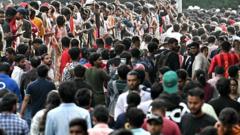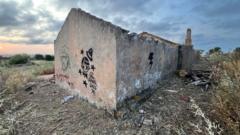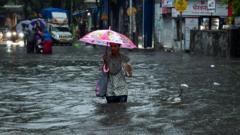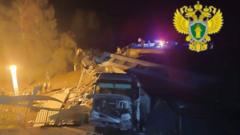**The article details the traumatic experiences of families affected by the recent stampede at the New Delhi Railway Station, prompting investigations and calls for accountability amid a backdrop of frequent crowd-related incidents in India.**
**Tragedy Strikes: Families Share Their Heartbreak Over Delhi Station Stampede**
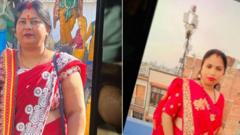
**Tragedy Strikes: Families Share Their Heartbreak Over Delhi Station Stampede**
**A deadly crowd crush at New Delhi Railway Station claims 18 lives, with families reeling from the aftermath.**
On a typical day, New Delhi Railway Station buzzes with activity as passengers hurriedly await their trains. However, the scene turned tragic on Saturday night when a crowd crush, attributed to severe overcrowding, led to the deaths of at least 18 people and left numerous others injured. Authorities indicated that delayed trains—including one bound for the significant Kumbh Mela religious festival—heightened the situation.
An Indian Railways spokesperson confirmed that the chaos began when a passenger slipped on the stairs, triggering a domino effect among the crowd. As investigations unfold, opposition leaders have criticized the government for failing to manage the crowd effectively, further fueling demands for accountability. Pankaj Gangwar, Principal Chief Security Commissioner of Northern Railway, suggested waiting for the investigation's conclusion before commenting on safety measures at the station.
Crowd crush incidents are regrettably common in India, particularly during large religious gatherings. Just last month, a similar incident resulted in 30 fatalities at the Kumbh Mela festival. This latest tragedy underscores the existing concerns surrounding overcrowding in public transportation, especially in a country where trains serve as the most economical means of long-distance travel.
Eyewitnesses and family members of the victims expressed profound anguish and anger towards authorities, indicating that timely help could have mitigated the disaster. Bipin Jha, who witnessed the death of his wife Mamta, described the horror of watching her succumb to the crush. "I will live my life with the guilt of not saving her," he lamented.
Other witnesses recounted the suffocating chaos, with people falling and being trapped beneath one another. Seema, whose sister-in-law Pinky Devi died, detailed the panic as the crowd surged forward on the stairs, resulting in a pile-up of bodies. Usha Devi experienced overwhelming fear as she reached the platform, where belongings and people lay scattered, a scene too chaotic to board her train.
Umesh Giri, who lost his wife Shilam Devi in the stampede, echoed the concerns about public safety. "The crowd became uncontrollable," he said, expressing frustration over delayed assistance. The injured victims were transported to Lok Nayak Jai Prakash Hospital, where police and paramilitary forces appeared to maintain order amid the chaos. However, family members voiced dissatisfaction with hospital conditions, noting overcrowded wards.
At Lady Hardinge Hospital, the grieving family of young Riya, aged 7, completed the necessary procedures to receive her body, with her uncle Vivek heartbreakingly declaring, "No child deserves to die like this." As the community mourns, the call for improved safety measures and accountability grows increasingly urgent.





